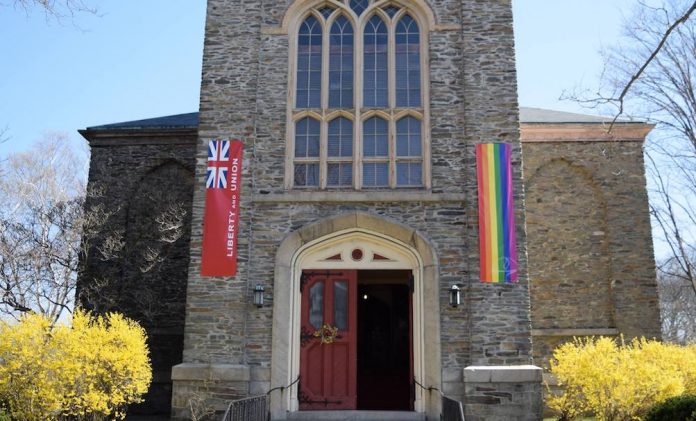The Unitarian Universalist Association’s board unanimously voted to recognize Taunton’s First Parish Church as a “Welcoming Congregation” for LGBTQ people in late April.
“We weren’t super noticeable as being LGBT inclusive before. Coming here was the first time in my life when I walked into a church and felt welcomed, which was a big shift after 14 years in the Catholic Church,” First Parish Congregational Administrator Lindi Malo told the Taunton Daily Gazette, which went on to report:
“For 25 years we have worked hard to make sure lesbian, gay, bisexual, transgender and queer people are full members of our faith communities,” the UUA states on its website in describing the Welcoming Congregation designation.
“Being welcoming means striving for radical inclusion, and creating spaces that honor every part of our identities, backgrounds and experiences.”
The main purpose of receiving the designation, Malo said, is to allow those in the LGBT community looking for a church accepting of their sexuality to have a streamlined and safe means of doing so. …
A letter sent to First Parish on behalf of the UUA’s LGBTQ and Multicultural Programs Manager Michael Crumpler praised First Parish’s inclusive programming and “radical hospitality” through the years.
“I am always struck when a congregation situated in such a small community such as yours chooses to take on this important work…is so delightful to learn of the breadth of work you have done to commit to becoming a Welcoming Congregation,” Crumpler wrote, specifically mentioning First Parish’s Church Block Party, “Rainbow Principles” and Kindness Rock garden. …
Going forward, [First Parish’s Rev. Christana] McKnight said that she and those at First Parish would continue to promote the congregation’s acceptance of not only those in the LGBT community, but also those who may have felt that they did not belong in other churches.
″(To survive) churches need economically to be welcoming, but I believe that it’s a theological imperative. I don’t think there is any biblical or any other theological reasoning to discriminate, that’s my belief — people will probably argue with me on that, and they do,” said McKnight.
“I grew up in this faith and I’m still here because I’m not one to say something without believing it…our congregation is certainly very engaged and we expect to continue growing because we’re doing things that are relevant today.”










